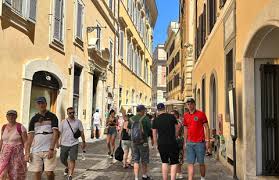Absolute poverty and disparity a national threat: What is happening in Italy?

Rome: Italy is in a state of national disparity as the share of its wealth is massively unequally distributed. Around 5% of households own up to 50% of the country’s wealth, according to Oxfam, as nearly 6 million live in a state of “absolute poverty” and the rates are at an all time high, according to Caritas.
In 2024 the wealth of billionaires in Italy increased by some 61 billion euros, or 166 million euros every single day, amassing to a total of 272.2 billion euros owned by only 71 individuals.
At the other end of the scale, those without many financial resources are in peril. Oxfam released their annual report: ‘Inequality: Unfair poverty and undeserved wealth’ on Monday January 20, which found that 2.2 million households are in “great concern” to stay afloat amid the European cost of living crisis that damages some countries much more than others.
ISTAT, the national statistics institute for Italy, has said that the number of those in crisis financially has risen dramatically over the last 10 years, which begs the question: what is happening in Italy? And how can citizens rectify their burdening situation?
Disparity is common across the world, with the elite taking the lion’s share of wealth globally. In Italy, that figure is amplified and the ratio is highly unfair to residents who struggle to get through each day without looming debt, whilst worrying where their next paycheck will come from, if at all.
Inflation is partly to blame here, as in 2023 the rate increased to over 8%, way higher than the target of the European central bank of 2%. In 2024, it decreased massively to 1%, but this still has not fully helped the poorest residents to solve their crisis.
It is argued by many that disparity is reflected in the north-south divide, where those in the regions closer to Switzerland and in the north of the country receive more opportunities, more financial security, and in general, a better quality of life due to increased wealth.
According to Italian economist Tito Boeri, to be in ‘absolute poverty’ if you live in a city in the north, you would be earning less than 817.56 euros per month, after taxes. In the south, that number plummets to less than 554 euros per month.
Why is poverty such a damning issue, especially for southerners?
Many experts argue that the issue still remains because the GDP of Italy is not fairly redistributed to those who actually need it, as the disparity figures alarming dictate. 5% of the wealthiest families in Italy hold access to 47.7% of the national wealth, Oxfam said in their report.
The report was published for the World Economic Forum annual meeting in Davos, and highlighted a “great concern” for struggling Italian residents, which account for over 2.2 million households today in financial peril.
Expats are impacted too by this, with nearly 30% of all expats having at least one member in the family in ‘absolute poverty’, according to ISTAT figures.
The younger population are some of the most heavily affected, with around 1.3 million minors living in financial crisis.
On the whole, some 25% of Italians are likely to suffer the risk of poverty or social exclusion, compared to around 20% on average for the EU population according to Eurostat data.
More opportunities to get stable and financially sound jobs are needed, but also education needs to be reformed in a way that will mean younger people have tangible access to viable skills and traits, as well as knowledge that will help them realise the proper ways to gain credible amounts of wealth. At least, to earn more than the threshold for living in poverty.
For many, that means getting out of the country, with countless expats from Italy regularly jetting to other European countries, such as Italy or Germany, to find careers and a social system that will complement their skill set and give them what they need.
In Italy, it just cannot be provided a lot of the time, with social infrastructure lacking in key areas, which does not correlate justly with the country’s annual GDP. Billionaires take the majority, and the economic growth Italy experiences is simply not fairly given out to its population.
Governmental reform in key areas such as the labour market, educational resources, construction for affordable homes, and sectors such as transport is needed urgently to get Italy’s people back on its feet and transform their outlook, as right now, it is bleak.





